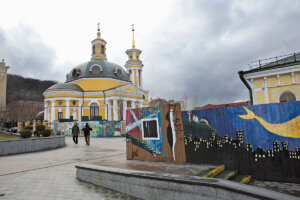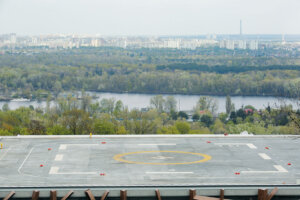Five years after the EuroMaidan Revolution that ousted the Kremlin-backed Viktor Yanukovych, Kyiv is still battling with real estate corruption schemes created by the ex-president’s inner circle.
On Feb. 6, a Kyiv court ruled that the Parkovy Exhibition Center, better known as Yanukovych’s helipad because of the helicopter landing pad on its roof, would be transferred back from the city to its former owner, Amadeus Co. — a company previously linked to Yanukovych’s inner circle and now controlled by Maxim Efimov, a businessman and lawmaker from the 135-member Petro Poroshenko Bloc.
And just a couple of kilometers from Parkovy, the historic Poshtova Plosha has became a battleground between shell company Hensfort-Ukrayna, which controversially gained the right to build a shopping mall there in 2013, and the public, who want the historic site to be preserved.

People walk on Poshtova Square on March 5, 2019, in Kyiv. Construction on the site, which may hide important archaeological remains, has been stalled since 2014. (Kostyantyn Chernichkin)
At the other end of Sahaydachnoho Street from Poshtova Plosha, the historic building Hostynyi Dvir is stuck in a bureaucratic limbo — control of the crumbling building was retaken by the state as a result of a four-year trial against a company connected to Andriy Kravets, an associate of Yanukovych.
Mafia helipad
The Parkovy Exhibition Center was swamped in scandal from the get-go, when in 2010 control of the land — a site protected by UNESCO as part of the Kyiv Pechersk Lavra — was transferred just months after Yanukovych became president. The plan was to build an exhibition center with a helipad on top.
Long after Yanukovych fled to Russia, control of the business exhibition center is disputed between Amadeus Co. and the State Agency for Retrieving Stolen Assets, or ARMA.
In May, a court ruled that ARMA be allowed to manage Parkovy, which was then under attachment. The agency signed an agreement with Kyiv’s utility company, allowing the later to exploit the facility. According to Anton Yanchuk, head of ARMA, Parkovy was one of the agency’s most successful ventures, with the state budget receiving Hr 800,000 ($30,000) profit from managing the facility in late 2018.
However, with the process of confiscating Parkovy from Amadeus Co. and turning it over to the government being stuck in judicial limbo since 2014, the property was taken over by lawmaker Efimov through a number of proxies in December 2017, according to the investigative journalism project Bihus.info.
With the exhibition center now being returned to Amadeus Co., Efimov wrote on Feb. 19, on Facebook that the company is now officially owned by Lubov Efimova, the lawmaker’s 82-year old mother.
“As a member of parliament, I have no right to engage in commercial activities and, of course, I will not do that. The beneficiary of this business is my mother,” wrote Efimov on Facebook.
This is not the first case in which assets controlled by those close to Yanukovych have come into the ownership of the incumbent president’s inner circle. Efimov recently bought Donbassenergo, which was previously controlled by Oleksandr Yanukovych, the son of the former president.
Poshtova Plosha
A slightly different fate awaited Poshtova Square, a historic site in Kyiv’s Podil district. While Parkovy was successfully built on a former historic site, the preservationists stood their ground at Poshtova Square.
The initial land-grab process was similar. A land plot at Poshtova Square was successfully transferred in 2013, and given to a shell company allegedly owned through proxies by Maryna Pelykh, the wife of Andriy Kravets, a former member of Yanukovych’s Party of Regions and a close ally of Yanukovych himself. The plan was to build a 1,000-square-meter underground shopping mall.
However, since Poshtova Square is within Kyiv’s ancient boundaries, the law obligated the company to perform archeological excavations prior to beginning construction.
The digs were successful, with several relics dating back to medieval Kyivan Rus times found at the site. Because of protests by activists and the 2014 EuroMaidan Revolution, the construction of the shopping mall stalled. Five years later, little has changed.
Hensfort-Ukrayna, a company without an office, website or a working phone number, still officially owns the site.
Vyacheslav Baranov, an archeologist and senior expert from Kyiv’s Archaeology Institute, told the Kyiv Post that there hasn’t been any archaeological activity there in over a year, with the government failing to issue an official decree that would allow an archeological dig to be conducted at the site.
However, that’s not the biggest problem, according to Baranov, since archeologists, similar to the public, are being kept in the dark about what’s going to happen to any archeological discoveries.
“And because we don’t know what’s going to be (built on the site), we don’t know where to dig,” says Baranov.
Iryna Zolotar, spokeswomen at the Kyiv city council, said that the city had petitioned in late 2018 for the state to register the site as one of historical significance, with the final decision yet to be voted on by the government. She added that further construction has been banned by a court order, however this creates additional problems for the protection of the archeological site — since all construction is banned, even construction that is needed to prevent water from damaging relics that remain in the ground cannot be performed.
But the contract with Hensfort-Ukrayna is still in place. In a recent comment to 112 Channel, Valentyn Mondryivskyy, deputy head of the Kyiv city council, said that the city isn’t planning on unilaterally canceling the shopping mall construction as it is an “investment project.”
Hostynyi Dvir
A short distance from Poshtova Ploshcha, the historic building of Hostynyi Dvir is an exceptional case, being an example of a successful recovery by the state of a stolen asset.
In 2011, the Cabinet of Ministers excluded the 19th century building in the heart of Kyiv’s ancient Podil from the list of historical landmarks protected by the government. The building was later transferred to a company called Ukrayna Restovratsya, which is allegedly controlled by Yanukovych associate Kravets.
It had been planned to redevelop Hostynyi Dvir into an elite shopping mall, but the historic building was collapsing, with little to no preservation efforts being made.
After the change of government, the Cabinet of Ministers ruled that the exclusion of Hostynyi Dvir from the list of protected sites was illegal. With the landmark building falling into ruin, the state regained possession of the property in late 2018, terminating a contract that had been scheduled to end on March 10, 2019.
But in an ironic end to the story, on Feb. 21, five years after the mass killings in downtown Kyiv, investigative journalists from Schemes, a project run by Radio Free Europe/Radio Liberty, reported that Ukrayna Restovratsya, which is controlled by Yanukovych’s associate Kravets, is now linked to the upcoming construction of a memorial honoring those killed during the EuroMaidan Revolution by Yanukovych’s security forces.

The Parkovy Exhibition Center was transferred from the state to a private company belonging to former President Victor Yanukovych’s inner circle. The exhibition center has a helipad on top.(Kostyantyn Chernichkin)
